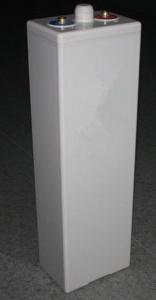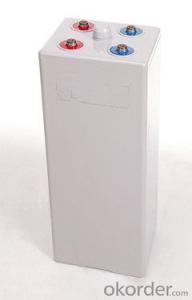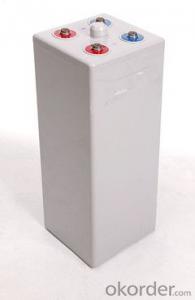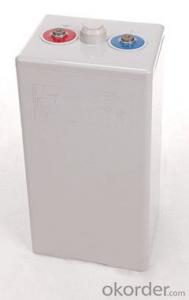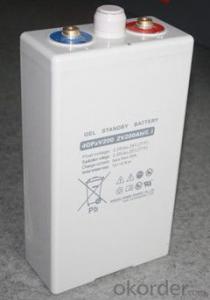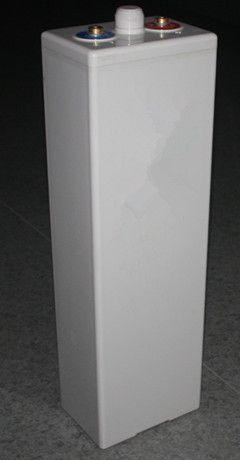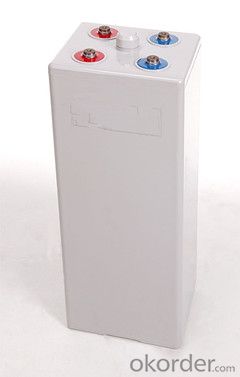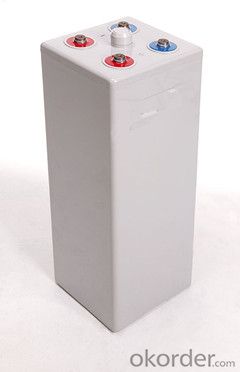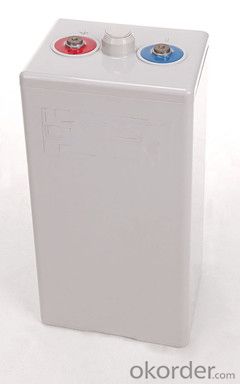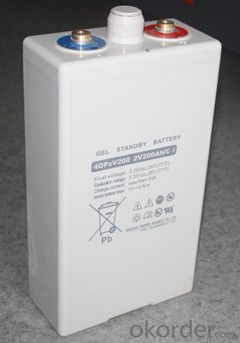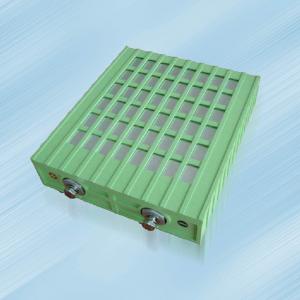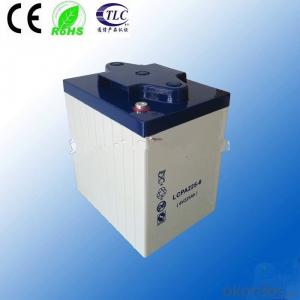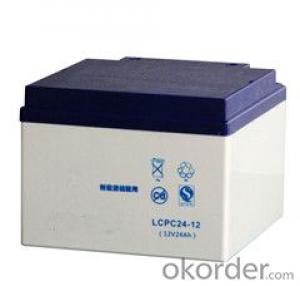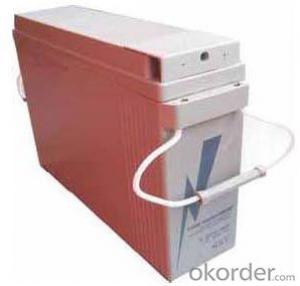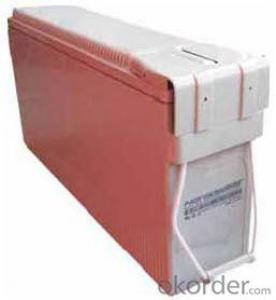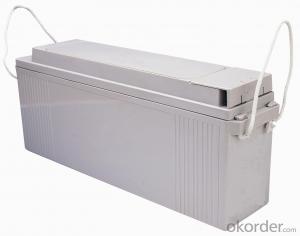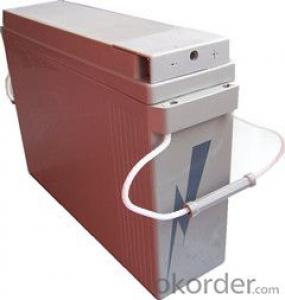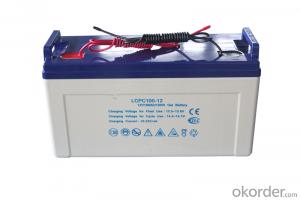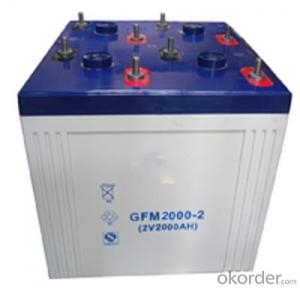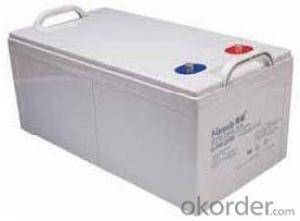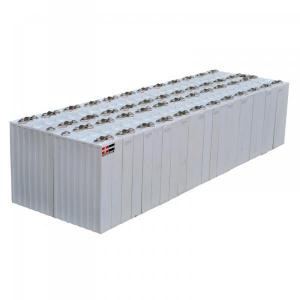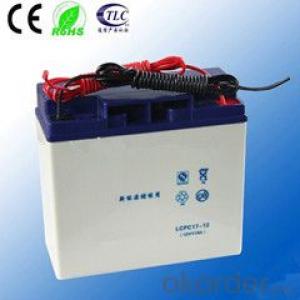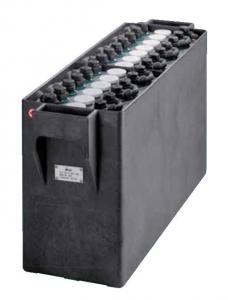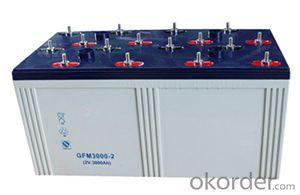Gel Technology Battery Ares(OPzV) Series 12OPzV 1500
- Loading Port:
- Shanghai
- Payment Terms:
- TT OR LC
- Min Order Qty:
- 1000 unit
- Supply Capability:
- 5000000 unit/month
OKorder Service Pledge
OKorder Financial Service
You Might Also Like
Gel Technology Battery Ares(OPzV) Series Introduction
Ares(OPzV) range battery adopts traditional gel technology .
The products are designed as standby power for communication, power, military and broadcast and television system with excellent deep cycle performance. The design float life is 18+ at 77oF(25oC)
The Ares(OPzV) range batteries are ensured the quality with NARADA's QA system according to the ISO9001 and ISO14001 standard.
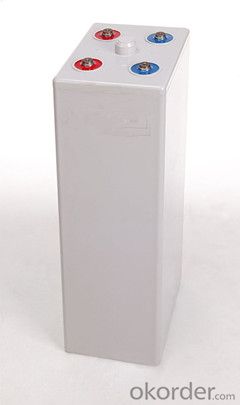
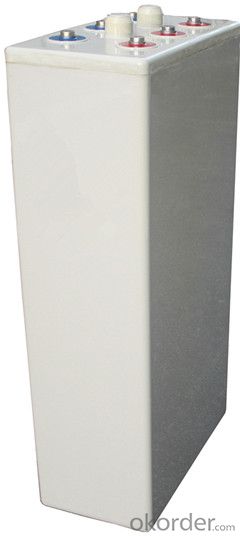
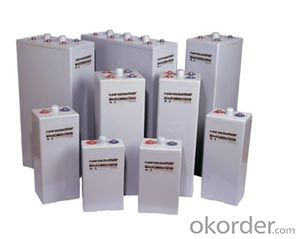
Type: | 12OPzV 1500 | |
Voltage: | 2V | |
Nominal Capacity: | 1500Ah(C10) | 1500Ah(10 hours rate:) |
Length: | 275mm | |
Width: | 210mm | |
Height: | 795mm | |
Height with termial: | 827mm | |
Weight: | 117Kg |
Gel Technology Battery Ares(OPzV) Series Technical Feature:
Traditional gel technology
18+ years design life under floating application and cycle life is above 1200 at 80% DOD under temperature 25 oC.
Reliable seal performance, no acid spillage, recombination efficiency reach 99.9%
Initial capacity above 100%, the remaining capacity above 94% after storage for 3 months (25oC)
low float charge voltage. design (2.23V/cell, 25oC), extremely consistent float charge voltage
Flexible connectors and convenient installation
Gel Technology Battery Ares(OPzV) Series Compliant Standards :
IEC60896-21/22
Din standard
UL
Manufactured under system ISO9001(TUV) and ISO14001(DNV) by Narada
Gel Technology Battery Ares(OPzV) Series Battery Iinstallation Compliant with:
EN 50272-2 or local equivalents
Gel Technology Battery Ares(OPzV) Series Main Application:
Telecommunications
Motive power applications
Railway and mining markets
Uninterruptible power supply (UPS)
Solar energy storage application
Other applications to provide integrated stored energy system
Gel Technology Battery Ares(OPzV) Series Products Characteristics:
Recommended float charge voltage for 2V battery: 2.23Vpc at 25oC(77oF)
Self discharge rate :< 2% per month at 25oC(77oF)
Design life: 18+ years at 25oC(77oF)
Shelf life: 6 months at 25oC(77oF)
Valve regulated system, no water addition needed
FAQ
![]() What is sulfation of batteries?
What is sulfation of batteries?
Sulfation is the formation or deposit of lead sulfate on the surface and in the pores of the active material of the batteries' lead plates. If the sulfation becomes excessive and forms large crystals on the plates, the battery will not operate efficiently and may not work at all. Common causes of battery sulfation are standing a long time in a discharged condition, operating at excessive temperatures, and prolonged under or over charging.
![]() How long a battery can last?
How long a battery can last?
The service design life of a battery are vary considerably with how it is used, how it is maintained and charged, temperature, and other factors.
![]() Do batteries self-discharge when not in use?
Do batteries self-discharge when not in use?
All batteries, regardless of their chemistry, self-discharge. The rate of self-discharge depends both on the type of battery and the storage temperature the batteries are exposed to. However, for a good estimate, Narada batteries self-discharge approximately 4% per week at 80ĄăF.
- Q: How is the capacity of the battery defined?
- General circuit has a battery protection circuit, once the battery voltage is less than 10.8V will automatically cut off the electricity to prevent the battery because of over-discharge and damage. (Nominal value of 12V battery internal six cell grid) with the battery discharge current multiplied by the discharge time to express how much energy the battery can store, is a very image of a measure. The greater the value of the battery, indicating that the battery can store more energy. But does not mean that the battery can use such a large current discharge.
- Q: What is the difference between a maintenance-free battery and a conventional battery?
- Different materials will produce a different phenomenon: the traditional battery in the course of the use of the phenomenon of liquid reduction occurs, because the antimony on the grid will pollute the sponge on the negative plate of pure lead, weakened after the full charge of the battery Electromotive force, resulting in excessive decomposition of water, a large number of oxygen and hydrogen, respectively, from the positive and negative plates to escape, so that the electrolyte reduced. With calcium instead of antimony, you can change the fully charged battery back electromotive force, reduce the overcharge current, liquid gasification rate decreases, thereby reducing the loss of electrolyte.
- Q: What are the technical parameters of the battery?
- Usually the capacity of the power supply is expressed by kV · A or kW. However, as a power supply VRLA battery, the use of security (A · h) that its capacity is more accurate.
- Q: How to deal with waste batteries?
- The rest of the various types of waste batteries are generally shipped to a special toxic, hazardous landfill, but this approach not only cost too much but also cause waste, because there are many useful raw materials available.
- Q: What battery does the van use?
- General use of lead-acid batteries. Electrode is mainly made of lead and its oxide, the electrolyte is a sulfuric acid solution of a battery. English: Lead-acid battery Discharge state, the main component of the cathode is lead dioxide, the main component of the negative lead; charge state, the main components of the positive and negative are lead sulfate. Divided into exhausted batteries and maintenance-free lead-acid batteries.
- Q: What are the advantages of maintenance-free batteries?
- Maintenance-free battery because of its normal charging voltage, the electrolyte only produce a small amount of gas, so throughout the use of the need for the addition of distilled water, in the normal charging system, do not need to remove the charge from the removal. But in the maintenance of the proportion of its electrolyte should be checked.
- Q: What is the meaning of the battery above 12v65Ah?
- 12V is said to be the voltage, 65Ah is the current. (A is the unit of current. H is the time unit .1 hours.)
- Q: What is a maintenanceable battery?
- It also has a shock, high temperature, small size, self-discharge characteristics. Life is generally twice the ordinary battery.
- Q: Battery 200ah / 104 what does that mean?
- Lead-acid battery nominal voltage is 2V / (each or monomer), but in fact will be higher than 2V, so the actual use and charging equipment for the matching will use 104, also useful 103, also useful 108 Only.
- Q: How does battery activation work?
- If the battery is charged, because the battery discharge itself, the active substance to activate, not add acid, but should be added pure water (no minerals and impurities in the water) is best steaming water, and now you Since the addition, you can use water to wash several times, and then use 1C current charge to 2.3 times. Then discharge, so repeated several times, will be better. So that you can remove the vulcanization.
Send your message to us
Gel Technology Battery Ares(OPzV) Series 12OPzV 1500
- Loading Port:
- Shanghai
- Payment Terms:
- TT OR LC
- Min Order Qty:
- 1000 unit
- Supply Capability:
- 5000000 unit/month
OKorder Service Pledge
OKorder Financial Service
Similar products
Hot products
Hot Searches
Related keywords
